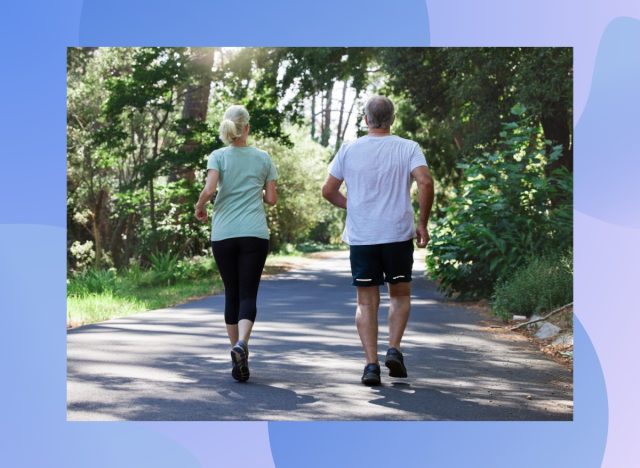6 Benefits of Walking Every Day—and How Many Steps You Actually Need

One of the easiest, no-equipment, most convenient forms of exercise you can do is going on a walk. It may sound simple, and it really is! All you need is a pair of supportive walking shoes and a solid trail, and the rest is really up to your creativity. Whether you only have five minutes to spare, or you have time for five miles, you can tweak your routine to best fit your schedule and lifestyle. What more could you ask for in a productive form of physical activity? We spoke with an expert who breaks down the best benefits of walking every day, along with how many steps you actually need.
Truth be told, any amount of movement you give yourself each day is healthy. You’ve likely heard about the “10,000 steps per day” recommendation provided by the Centers for Disease Control and Prevention (CDC). But according to Tyler Read, the founder of PTPioneer.com and a personal trainer who’s been involved in the health and fitness world for the past 15 years, although it’s a popular guideline, the amount of steps you should get each day isn’t a “one-size-fits-all number.” He tells us, “The ideal number of steps or minutes of walking varies based on individual goals, fitness levels, and lifestyles.”
To keep up your general health, Read recommends performing a minimum of 150 minutes of moderately intense aerobic exercise, like brisk walking, throughout the week. If weight loss is your goal, you may want to up this amount of physical activity, taking into consideration your diet and other lifestyle factors. Keeping your calorie intake in check, along with your energy expenditure, will help you pinpoint the right amount.
Rome wasn’t built in a day, and neither should any new aggressive exercise routine be. Start small, and work up to the total daily steps that feel best for you and your body. It’s always wise to check in with a healthcare professional and a certified personal trainer before starting any new fitness regimen.
So lace up your sneakers, and let’s get started learning all of the wonderful benefits of walking every day. And for more walking inspiration, be sure to check out The #1 Daily Walking Workout for Women to Get Fit.
Improved cardiovascular health

Getting in healthy steps each day has proven to boost cardiovascular health. In addition, Read explains, “It can lower the risk of heart disease, reduce blood pressure, and improve cholesterol levels.”
According to research presented at the American Heart Association’s Epidemiology, Prevention, Lifestyle & Cardiometabolic Health Scientific Sessions 2023, individuals aged 70 and above discovered that walking an extra 500 steps each day, or walking an extra quarter mile, was linked to a 14% decreased risk of stroke, heart disease, or heart failure.
Boosted bone density and muscle strength

As you age, it’s important to be mindful of your muscle strength and bone density. According to the Bone Health & Osteoporosis Foundation, around 10 million Americans suffer from osteoporosis, and 44 million experience low bone density (which heightens the risk of osteoporosis).
Read explains, “As a weight-bearing exercise, walking can help maintain bone density and reduce the risk of osteoporosis. It also tones muscles, especially in the legs and abdomen.”
Better digestion

By walking every day, you can really improve your gastric motility. “It can be particularly beneficial for individuals who suffer from digestive issues such as constipation,” Read points out. It’s important to include movement to get your body moving every day—in more ways than one!
Improved joint health

Establishing a regular walking habit can strengthen and offer lubrication to the muscles that support your joints, Read tells us. Research shows that 54.6 million adults living in the U.S. who have arthritis are typically less physically active than those who do not suffer from this debilitating condition. Walking can really improve your physical functioning and be an excellent pain reducer if you have arthritis. It can also put you at a lower risk of falling.
Enhanced mental health

Each time you head outdoors or hit up the treadmill for a walk, endorphins are released in the body. According to Read, these are “natural painkillers and mood elevators.” Walking can lower symptoms of anxiety and depression. As a matter of fact, walking is an amazing social activity that can help keep your brain and thinking skills in check, Harvard Health Publishing explains. Walking also supports new brain cell growth. So when you walk with a friend, you’re giving your brain so many wonderful things.
Weight loss and weight management

Walking can be a seamless yet incredibly productive tool if you want to lose weight or manage your weight. It’s an easy, natural calorie burner. Read tells us, “While walking might not burn as many calories as more intense exercises like running or cycling, it still provides a steady calorie burn which can accumulate over time.” In addition, “Regular walking can boost the basal metabolic rate (BMR). A higher BMR means you burn more calories even when at rest.” By walking briskly, you can help your body “tap into fat reserves for energy,” which supports fat loss.
- Source: https://www.cdc.gov/pcd/issues/2022/21_0343.htm
- Source: https://newsroom.heart.org/news/for-older-adults-every-500-additional-steps-taken-daily-associated-with-lower-heart-risk
- Source: https://www.bonehealthandosteoporosis.org/wp-content/uploads/Osteoporosis-Fast-Facts-2.pdf
- Source: https://pubmed.ncbi.nlm.nih.gov/34618794/
- Source: https://www.health.harvard.edu/staying-healthy/better-together-the-many-benefits-of-walking-with-friends









